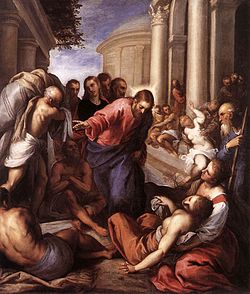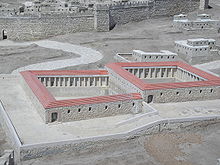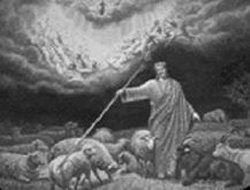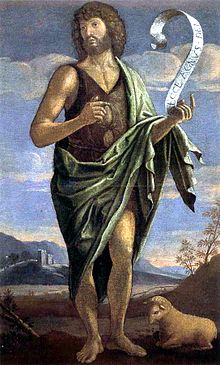Bible: What Does John 5 Teach Us About Jesus, the Messiah?
Jesus Heals the Paralytic on the Sabbath

The Pool at Bethesda

Jesus is Lord of the Sabbath
Another Passover arrives. Jesus visits Bethesda, a pool by Jerusalem’s Sheep Gate where many people afflicted with various physical problems have assembled.
(John reports the belief that Bethesda was known as a place of healing where any individual who first steps into the water of the pool (after an angel has stirred it up) was healed of his disease [vv. 1-4]).
Christ asks a certain paralytic who has been suffering from a debilitating condition for thirty-eight years if he wanted to be healed (vv. 5-6).
[Jesus draws upon His omniscience to know both the duration of the man’s paralysis and its cause (sin) [see 5:14].
While it appears obvious that a man in such a condition would want to be healed, Christ still asks the man what he wants.
Does God arbitrarily assert His will over people, or does He respect man’s freedom of choice? Or does a commingling of the two exist?\
Not only does the fellow communicate his desire for healing, but he also discloses his lack of an aide to put him into the water (v. 7).
Jesus’ word of command immediately heals the paralytic, who subsequently picks up his pallet and begins to walk.
This activity draws the ire of some Jewish leaders who considered carrying a pallet on the Sabbath to be a kind of work and thus unlawful (vv. 8-10).
The healed man tells the Jews that another one told him to take up his bed; however, at that time the man does not know his Benefactor’s name, nor can he point Him out to the Jews (vv. 11-13).
Only later does Jesus identify Himself to this fellow, and command him not to sin anymore (v. 14).
Having learned the name of the “sinner,” the man tells the Jews (v. 15).
[Did he not know that these leaders were Jesus’ enemies?
Given the fact that Jesus had just released him from a lifelong infirmity, why did he make a point of telling the Jews the identity of the One who cured him?]
Justification for Murder?
view quiz statisticsEquality with God
Surely enough, the leadership harangue Jesus for His flouting (in their eyes) of the Sabbath law (v. 16).
Christ’s rejoinder that both He and the Father have been working since the beginning of time sets their teeth on edge (v. 17).
They correctly interpret His meaning: He was claiming equality with God (the Father).
[How does calling God your own Father make you equal with God?
Is this a cultural understanding?]
Consequently, they seek to kill Him for blasphemy—as the apostle well points out (v. 18).
Jesus’ answer to them—a lengthy Christological discourse—asserts His authority in matters of life and judgment (vv. 19-47; see Ryrie, New Testament Study Bible, 170).
Yet the Son of God first explains His dependence on the Father.
[Does this “economy” exist only in His state of humiliation, or does it also extend into His ontological Trinitarian relationship?]
Twice Jesus states that He “can do nothing of Himself” (vv. 19, 30).
He describes Himself as an imitator of His Father (v. 19), and the Father as One who not only loves Him, but who will also show Him great miracles whose purpose aims to make them (the Jews?) marvel (v. 20).
[Why would He want the Jews to marvel?
To show them that Jesus is from God?
To authenticate His claim as Messiah?]
One such “work” is the power to resurrect the dead; both the Father and the Son have the ability to restore life to those who have died (v. 21).
Jesus, the Only Judge of Mankind

Time of Regeneration
view quiz statisticsJudgment and Resurrection
Jesus transitions from the topic of resurrection to that of judgment, stating that He alone (not the Father) has the prerogative to preside over “all judgment,” since the Father has delivered this authority to Him with the purpose that He should receive honor, i.e., be accepted as the divine Judge (vv. 22-23).
The only way to avoid condemnation and to acquire “everlasting life,” Jesus says, is to believe in the Father; this belief comes through hearing (and obeying) Christ’s word (message) [v. 24a].
Those who believe Jesus’ claims “pass from death into life” (v. 24b).
[What is the content of Jesus’ message that people must believe in order to bring these events to pass?
What comprises this “everlasting life”?
Passing from [spiritual] death into [spiritual] life reads like a movement from one state of being into another in the present time (“has passed”).]
The third “Most assuredly, I say to you” assertion in this discourse (vv. 19, 24, 25) points to both a present and future time when those “dead” people who hear His voice will live (v. 25).
[He had just talked about spiritually dead people hearing and believing (v. 24); this statement also refers to spiritually dead people, not to those who have died physically.
The fact He mentions that the “hour . . . now is” suggests that He is not talking about physical resurrection here.
Later, when He specifically states, “. . . the hour is coming in which all who are in the graves will hear His voice,” He is discussing the bodily resurrection of both believers and unbelievers alike (vv. 28-29).]
As the Father acts as the Son’s model for doing miracles (vv. 19-20), as well as the Executive in matters of judgment and resurrection (vv. 21-22), so He grants “the Son to have life in Himself” (v. 26) and to “execute judgment” as the Son of Man (v. 27).
[Again, the Son of God, while on earth, abides in a subordinate status not because He is a somewhat lesser Being than the Father, but because He voluntarily willed to take a position of humility at the Incarnation.
Verse 27 is repeating the idea of verse 22.]
Eternal Life and Eternal Death

Resurrections
Jesus speaks about two separate resurrections, not one general resurrection; a good case even exists to assert that the resurrections occur at various times.
“The resurrection of life” encompasses that of the Church at the Rapture, that of the Old Testament saints at Christ’s Second Coming to earth, and that of the millennium saints at the end of the thousand-year reign of Christ on earth.
“The resurrection of condemnation,” on the other hand, occurs at the Great White Throne Judgment (v. 29; cf. 1 Thess. 4:13-17; 1 Cor. 15:23-24; Rev. 20:11-15).
The Lord claims that His judgment is righteous because He seeks the Father’s will, not His own (v. 30).
[Granted, He has a will separate from the Father, but can His will differ from that of the Father?]
John the Baptizer, Scripture, and Moses



Witnesses to the Truth of Jesus' Claims to Deity
However, in order for His claims to stand up in court, Jesus needs others to bear witness to their validity (v. 31).
He offers, first, the testimony of “another,” which the Lord asserts He knows is true (v. 32).
At this time, Jesus does not specify who this “another” is.
Second, Jesus mentions John the Baptizer, whose sterling testimony the Jews rejoiced in for a while (vv. 33-35).
[Both clauses in verse 34 are puzzling.
Jesus seems to say that He does not receive testimony from man.
Does that mean that He does not receive John’s testimony because it is not, in some respect, divine?
He says “these things” that the Jews might be saved.
What is the referent for “these things”?]
Third, Christ lists His God-given “works” as a greater witness than John’s (v. 36).
Fourth, He states explicitly that the Father, Whom the Jews have never heard or seen, bears witness to Jesus’ claims (v. 37).
[Unless Jesus has now returned to elaborate upon His discussion of the Father’s witness that He began earlier (v. 32), He refers to the Holy Spirit in the former passage.]
The Jewish leadership does not believe in the Father’s sent-one, Jesus; therefore, they do not have God’s word abiding in them (v. 38).
Fifth, Christ designates the Scriptures as another witness—one that the Jews study diligently to “have” eternal life (v. 39).
[Does He mean that they think by knowing Scriptures they will somehow merit eternal life, or does He point out they think they view the OT as the answer book that will give them that life?]
Jesus claims to be the answer they seek, but they do not want Him (v. 40).
Christ knows that they neither honor Him, nor have God’s love in them (vv. 41-42).
They will follow false Messiahs—those who come in their own name—but they will not receive Christ, who comes as His Father’s representative (v. 43).
He asserts that it is impossible for them to believe in Him because they seek earthly honors, not heavenly ones (v. 44).
Sixth, Jesus now turns to His last witness: Moses (vv. 45-47).
He tells the Jews that this man (in whom they claim to trust), and not Christ (about whom Moses wrote), will accuse them as unbelievers before the Father (v. 45).
“If you truly believed in Moses,” Jesus says, “you would believe in Me” (v. 46).
Jesus logically concludes that since they do not truly follow Moses’ teachings, neither will they believe what He says (v. 47).
© 2014 glynch1








